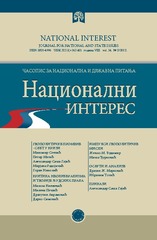Приказ основних података о документу
Kraj Hladnog rata, velika sila i geopolitika prirodnih resursa
The Ending of Cold War, Great Powers and Geopolitics of Natural Resources
| dc.contributor | Knežević, Miloš | |
| dc.creator | Radojičić, Mirjana | |
| dc.date.accessioned | 2018-06-18T12:20:53Z | |
| dc.date.available | 2018-06-18T12:20:53Z | |
| dc.date.issued | 2012 | |
| dc.identifier.issn | 1820-4996 | |
| dc.identifier.uri | http://rifdt.instifdt.bg.ac.rs/123456789/1568 | |
| dc.description.abstract | У тексту се полази од увида да су експоненцијални раст броја становника на Земљи, исцрпљеност природних ресурса, и борба за привилеговану позицију у дистрибуцији њиховог остатка, представљали кључне детерминанте геополитичке и геоекономске стратегије једине актуалне велесиле на планети у постхладноратовском раздобљу њене спољне политике. На примеру ратова против Ирака и Авганистана, али и снажног инволвирања у догађања у арапском свету током 2011. године („арапско пролеће“) ауторка тестира своју хипотезу да је моралистички интониран дискурс којим су ови амерички спољно-политички акти у јавности били легитимизовани („борба против тероризма“, „успостављање поретка демократије“, „заштита угрожених људских права“) представљао, заправо, реторичку камуфлажу оних аутентичних, енергетско-интересних мотива са којима су им САД и њихове западно-европске савезнице прибегавале. Са сличним мотивима актуални глобални хегемон је, према налазима овог истраживања, упливисао и на догађања на просторима Косова и Метохије, која су окончана окупацијом, доцнијим сепарирањем од остатка српског државног организма, а потом и међународно-правним субјективизовањем ове некадашње српске покрајине. Закључни део текста је својеврстан пледоаје ауторке за нове и радикално другачије - обновљиве видове енергије, мање девастирајуће по човеково, животно важно, природно окружење, али као потенцијални разлози за ратне сукобе међу државама и њихову трку у наоружавању, и по изгледе за његов врсни опстанак на планети у једном непосреднијем и ургентнијем смислу те речи. | sr |
| dc.description.abstract | In this text the author starts from an insight that the exponential growth of inhabitants on Earth, the exploited naturalresources and the struggle for a privileged position in the distribution of their remainder, used to present key determinants of geo-political and geo-economic strategy of the only actual superpower on the planet in the post-Cold War era of its foreign policy. Using the example of the wars against Iraq and Afghanistan, as well as the strong involvement in the events in the Arab world in 2011 (“Arab Spring”), she is testing her hypothesis that the moralistically-tuned discourse which legitimised these American foreign policy acts (“fighting terrorism”, “establishing order of democracy”, “protection of endangered human rights”) represented, in fact, a rhetoric camouflage of those authentic, energetically-interested motives which led the USA and their Western European allies towards them. Similar motives were what, according to the founding of this research, got the actual global hegemon involved in the events of the region of Kosovo and Metohija, which ended in occupation, followed by separation from the rest of the Serbian state organism, and then also by international-legal subjectivization of the former Serbian province. The concluding part of the text is sort of a plea for new and radically different – renewable energy sources, less devastating for human, vitally important, environment, yet as potential reasons for war conflicts among countries and their race for weapons, and also for his better chances to survive as a species on this planet in a more direct and more urgent sense of the word | en |
| dc.language.iso | sr | sr |
| dc.publisher | Beograd: Institut za političke studije | sr |
| dc.relation | info:eu-repo/grantAgreement/MESTD/Integrated and Interdisciplinary Research (IIR or III)/43007/RS// | sr |
| dc.rights | openAccess | sr |
| dc.rights.uri | https://creativecommons.org/licenses/by-nc-nd/4.0/ | |
| dc.source | Nacionalni interes | sr |
| dc.subject | geopolitika | sr |
| dc.subject | geoekonomija | sr |
| dc.subject | prirodni resursi | sr |
| dc.subject | velika sila | sr |
| dc.subject | međunarodna politika | sr |
| dc.subject | međunarodna etika | sr |
| dc.subject | geopolitics | sr |
| dc.subject | geoeconomics | sr |
| dc.subject | natural resources | sr |
| dc.subject | great power | sr |
| dc.subject | international politics | sr |
| dc.subject | international ethics | sr |
| dc.title | Kraj Hladnog rata, velika sila i geopolitika prirodnih resursa | sr |
| dc.title | The Ending of Cold War, Great Powers and Geopolitics of Natural Resources | en |
| dc.type | article | sr |
| dc.rights.license | BY-NC-ND | sr |
| dcterms.abstract | Радојичић, Мирјана; Крај Хладног рата, велика сила и геополитика природних ресурса; Крај Хладног рата, велика сила и геополитика природних ресурса; | |
| dc.rights.holder | Izdavač | sr |
| dc.citation.issue | 2 | |
| dc.citation.volume | 14 | |
| dc.citation.spage | 79 | |
| dc.citation.epage | 99 | |
| dc.type.version | publishedVersion | sr |
| dc.identifier.fulltext | http://rifdt.instifdt.bg.ac.rs/bitstream/id/3194/cd1-NI-2-2012.pdf | |
| dc.identifier.rcub | https://hdl.handle.net/21.15107/rcub_rifdt_1568 |

